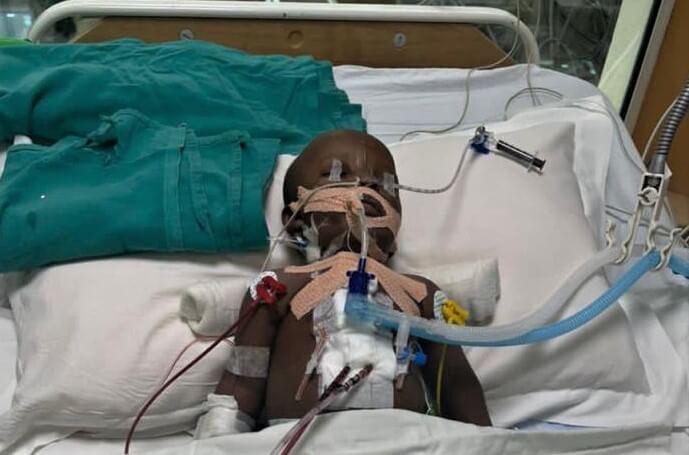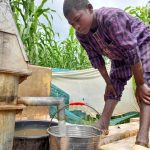FREETOWN, SIERRA LEONE: In 2018, Mustapha, then 9-month-old, suffered biliary atresia, a blockage in the tubes that carry bile from the liver to the small intestines, causing the bile to accumulate in the liver and destroy it.
With his liver damaged, Mustapha needed a transplant before he was one year old, and thankfully, his mother’s liver matched his, and she was ready to donate. However, the operation could not be done in Sierra Leone, his country, because no hospital there was equipped enough to do it successfully.
Doctors in Sierra Leone recommended that he be flown to India. But, Christphine, his single mother, could not afford the estimated $36,000 bill for the operation in India.
Sierra Leone is the third poorest country in Africa per GDP, with 53% of the population living below the national poverty line of $1.25 and way under the World Bank’s line of $1.9. The poor economy plus political corruption mean the healthcare sector is underfunded, under-staffed, and under-equipped, making it one of Africa’s weakest. As many as 107 children per every 1000 live births die before they turn five, says UNICEF.
People with severe health conditions in Sierra Leone are often referred to hospitals abroad for quality treatment, but most citizens cannot afford the cost.
From one to 226
Desperate to save her baby, Christphine approached one Peter Konteh, a reverend father and executive director of Caritas, a Roman Catholic charity in Freetown, the country’s capital, requesting help from the charity. However, the charity could not help immediately for lack of resources.
But Konteh was willing to raise money outside the charity to save the boy, so he asked one Ishmeal Charles, his colleague at Caritas, to lead a fundraising campaign.
Charles immediately put together a team of volunteers who, for more than two months, moved daily from one major street to another, market, park and highway in Freetown carrying postcards that narrated Mustapha’s health challenge. They strapped themselves with boxes calling out for donations from passersby. The effort paid off.
“We made contacts with donors and raised $41,000 within three months,” Ishmael told Prime progress. And in India, Mustapha’s transplant went successfully.
“It was a 15-hour surgery which required 60% of my healthy liver transplanted into my son. I am thankful that the procedure was successful with minimal risk,” Christphine said.
However, what Charles thought would be a one-off intervention soon spiralled beyond his expectation. The story of his fundraising and the successful operation on Mustapha soon travelled through word of mouth across Freetown.
Before long, more parents of children with critical conditions were reaching out to Ishmael, asking him to do for their sick kids what he did for Mustapha.
“After this, we could no longer stop, and this made us become an initiative that helps sick babies,” he said.
Charles, also the in-country for Healey International Relief (a charity supporting vulnerable people in Sierra Leone), called the initiative Sick Pikin Project, which translates to “Sick Child Project.” He said the project’s fundraising approach is tied to an African concept called osusu, which means raising contributions from everyone’s purse, no matter how little, to help someone.
So every time his 17-man volunteers position themselves in Freetown to raise funds, they chant, ‘donate to save a life; no amount is too small.’ The amount realised is used to cover a child’s medical bills, transportation out and back to the country, and other necessary expenses.
For children whose conditions can be handled in Sierra Leone, Charles’ initiative places them in Sierra Leonean hospitals capable of handling the case.
These days, hospitals and media houses refer parents of children with critical conditions to the nonprofit. Upon first contact, Sick Pikin conducts a medical review of the case.
If the child’s condition requires treatment abroad, the medical report is sent to a partner hospital in India, requesting an invoice. Once the invoice arrives, the project begins a fundraising campaign.
‘Demanding’
The initiative has supported 226 children – including those with congenital heart disease, imperforate anus, hydrocephalus (excessive fluids in the brain’s cavities), and brain tumours. About 115 were treated in India, two in Europe, two in Senegal, and the rest in Sierra Leone.
Yet, Sick Pikin currently has a long list of children needing urgent support, “but we can only process one child at a time,” 39-year-old Charles said, implying that requests are more than the group can handle per time.
“As I speak, we have 53 children we are trying to raise funds for. People believe we have the solution because of the recorded success.”
Shortly after Mustaha’s case in 2018, Ishmael started an online fundraising campaign on GoFundMe, an online fundraising platform, to complement physical efforts.
But responses remain short of expectations, partly because GoFundMe excludes some African countries from its list of countries people can donate from. Nigeria and Sierra Leone, for example, are currently excluded.
“It is poking me,” Charles said in frustration. “Even to create the GoFundMe account, one has to use a US address.” To create the account, he had to set up a US office coordinated by Sierra Leonean supporters living in the US, thinking that anybody from anywhere could donate after its creation.
And sadly, the initiative has lost four children since 2018—all developed complications after their surgical processes abroad.
“This year, we have recorded two losses. One child died in India in August, while another died in Freetown after developing health complications. It is devastating when we lose a child because the project’s purpose is to save children and give them another chance at life,” Charles said.
Surbhi Suden, one of the doctors in India’s Max Super Speciality Hospital treating some of Sick Pikin Project’s children, told Prime Progress that complications only arise due to some children’s parents’ negligence after leaving India.
“These children develop fever or diarrhoea and the parents mostly self-medicate rather than taking the children to the hospitals for a proper check-up,” she said.
But Charles said he finds consolation and encouragement in that 98% of operations carried out on children have been successful.
Meanwhile, Mustapha, now five years old, is healthy but closely monitored by his doctors.
This story was produced with the support of Nigeria Health Watch through the Solutions Journalism Network, a nonprofit organisation dedicated to rigorous and compelling reporting about responses to social problems.
FREETOWN, SIERRA LEONE: In 2018, a 9-month-old boy named Mustapha suffered from biliary atresia, a liver condition requiring a transplant before his first birthday. Although his mother's liver matched, the necessary operation couldn't be performed in Sierra Leone due to inadequate medical facilities.
Faced with an estimated $36,000 bill for surgery in India that his mother, Christphine, couldn't afford, she turned to Reverend Father Peter Konteh of Caritas, a Catholic charity. Lacking immediate resources, Konteh initiated a fundraising campaign with volunteer Ishmeal Charles, successfully raising $41,000.
Mustapha's successful transplant in India led to the creation of the Sick Pikin Project, an initiative led by Charles to help other critically ill children. The project employs an African fundraising model called osusu, collecting small donations from the public to cover medical expenses.
Since its inception, the Sick Pikin Project has supported 226 children with various conditions, though resources remain limited, handling one case at a time. Despite fundraising challenges, including limitations on platforms like GoFundMe, and some losses due to post-surgical complications, the initiative boasts a 98% success rate in operations.
Mustapha, now five years old, remains healthy and under medical supervision. The project continues to receive and address numerous requests for assistance, emphasizing its significant impact in Sierra Leone's struggling healthcare system.






